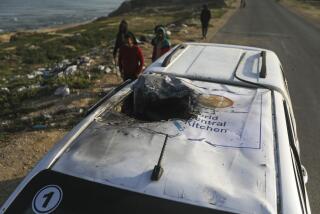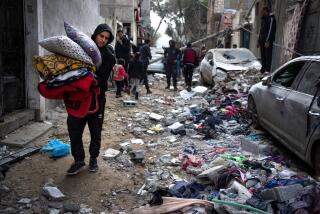Ending the Appalling Slaughter of Innocents : Bush is right to rally armed U.N. intervention in Somalia
Heart-rending scenes of worsening starvation in anarchic Somalia, the increasing theft of emergency food shipments by uncontrollable bandit gangs and the valiant but barely effective relief operations mounted by international organizations have moved the Bush Administration to a political decision it had clearly sought to avoid.
Washington now stands ready to send as many as 30,000 troops--including combat units--to the civil war-ravaged east African country in a bid to save hundreds of thousands now threatened by drought and a largely man-made famine.
The offer to U.N. Secretary General Boutros Boutros-Ghali is, quite properly, conditional. First, the United Nations must authorize armed intervention. Second, other countries must contribute to the effort. Third, U.S. troops must remain under American command. Boutros-Ghali is expected to ask the Security Council next week to authorize the use of force in Somalia, and no serious objection to assuring that U.S. troops would remain under U.S. command is foreseen.
The difficulty could come in getting other U.N. members to contribute to the operation. For it’s a paradoxical--and dispiriting--fact of international political life that intervention for humanitarian purposes sometimes seems harder to bring about than more dangerous ventures. Unlike earlier cases of U.N.-authorized intervention--Korea in 1950 or Kuwait in 1990--in Somalia no compelling strategic rationale presents itself. Granted, threats of confrontation between the U.N. forces and armed gangs have to be considered, and the possibility of casualties taken into account. Weighed against this is the moral imperative to act out of common humanity to end the slaughter of the innocents.
The violence and famine that have taken the lives of at least 300,000 Somalis are not of foreign origin but the product of a no-quarter internal power struggle. There is thus no outside aggression to be repelled, no vital resource like oil to be protected. Instead there is the simple need to try to save great numbers of lives threatened by famine--up to 2 million, according to a U.N. estimate. That requires breaking the stranglehold of the warlords who have so devastated the country and who now steal half or more of the food aid arriving from the outside.
The United States is right to try to rally armed U.N. intervention. But it’s no less right in insisting that others do their fair share. Besides enlisting partners for intervention, Washington must make clear to the American people, as Gen. Colin L. Powell, chairman of the Joint Chiefs of Staff, has privately argued, the nature and limits of what it proposes: the precise mission of the U.S. forces, the degree of force they would be prepared to use, about how long they would be committed, under what conditions they would be withdrawn.
Meanwhile, a readiness to intervene having been announced, the need for prompt action becomes even more urgent. Some hundreds of relief workers in Somalia could face greater peril as the prospect of a large foreign intervention increases. The Security Council should move quickly to authorize a bold and imperative effort to save the starving.
More to Read
Sign up for Essential California
The most important California stories and recommendations in your inbox every morning.
You may occasionally receive promotional content from the Los Angeles Times.










